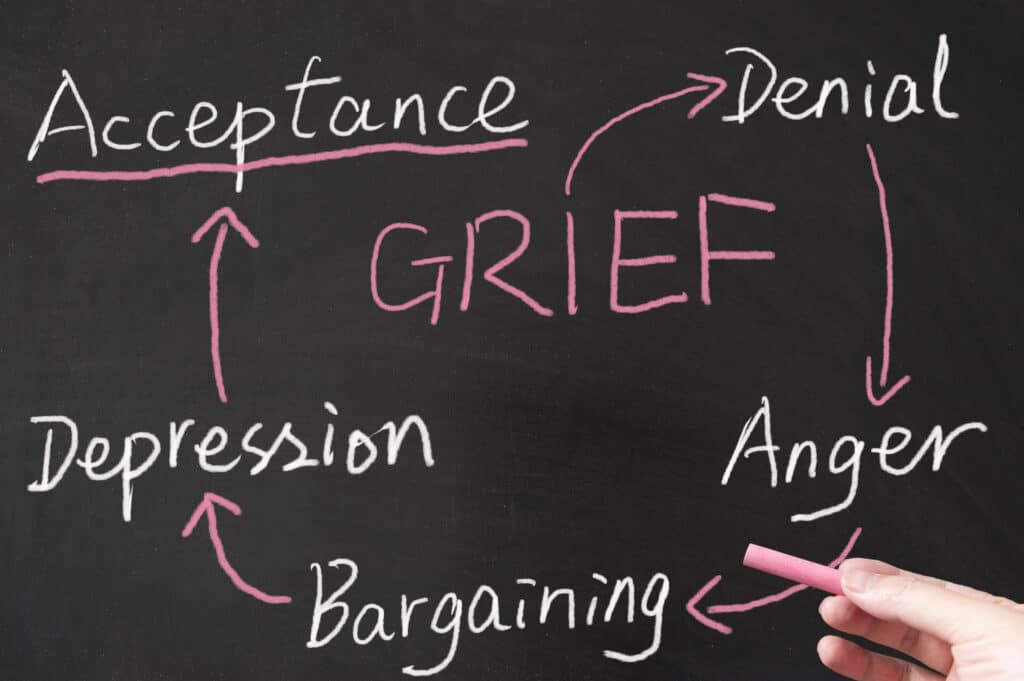Grief – Santa Maria College

Coping with the loss of someone or something you love is one of life’s biggest challenges and something we will all face at some time in our lives.
Grief is commonly linked to the death of family or friends, but it can also happen when you lose something of value. In society, grief can occur in adults or children and may be due to family breakdown, loss of health, loss of a job or financial stability, miscarriage, death of a pet or loss of a friendship. Grief may be due to receiving a medical diagnosis, being informed of a learning disability or when mental illness impacts a family. Our Boarding families may suffer grief when having to say goodbye to a child and send them to boarding school. Drugs and alcohol can also cause much grief in families.
Grief is not linear, which means it cannot be turned on or off like a switch. Instead, it ebbs and flows in unpredictable waves. Grieving can take weeks, months, or even years. It is important to allow yourself time to grieve and to reach out for support if you need it.
The pain of grief can also disrupt your physical health, making it difficult to sleep, eat, or even think straight. Its personal to you and different for everyone.

It is important to understand the five stages of grief so that you can manage the process in a healthy way. Grief does not necessarily happen in chronological order, but the five steps are:
- Denial -The first step in the grieving process is denial. This is when we try to protect ourselves from the pain of loss by refusing to accept that it has happened. We might deny that the person or thing we have lost was ever really part of our lives or that we ever cared about them. Denial can be a way of trying to hold on to the past and keep our loved ones with us. It can also be a way of shielding ourselves from the full impact of the loss. Denial is a natural defence mechanism, and it is often only temporary. Eventually, we will have to face the reality of what has happened.
- Anger – The second step in the grieving process is anger. We might feel angry at ourselves, at the person or thing we have lost, or at the world in general. This is a natural reaction to loss, and it is important to allow yourself to feel this emotion. It is also important to find healthy ways to express your anger.
- Bargaining – The third step in the grieving process is bargaining. This is when we try to make deals with ourselves or with a higher power in order to avoid the pain of loss. We might bargain for more time, for a different outcome, or for anything that could take away the hurt we are feeling. Bargaining is often a way of trying to regain control over a situation that feels out of our control.
- Depression – The fourth step in the grieving process is depression. This is when we start to come to terms with our loss and the reality of our new situation. We might feel sad, despairing, or hopeless. These are all normal reactions to loss. It is important to allow yourself to feel these emotions and to express them in healthy ways.
- Acceptance – The fifth and final step in the grieving process is acceptance. This is when we have come to terms with our loss and have started to move on with our lives. We might still feel sadness and pain, but we are beginning to heal. Acceptance does not mean that we are happy about the loss, but simply that we have accepted it.
The grieving process is different for everyone. Some people move through the steps quickly, and others take longer. There is no right or wrong way to grieve. Grieving is a process that takes time, patience, and understanding. Allow yourself the time you need to heal, and reach out for support if you need it.
If you are struggling to cope with grief, it is important to seek professional help. A counsellor or therapist can help you to understand and work through your emotions.
Grief is a normal and natural reaction to loss, but it can be difficult to deal with. Family, friends, and professionals can provide much-needed support to help come to terms with grief.
A great resource from Beyond Blue

The Power of Expectations in Shaping Student Success – Jennifer Oaten
Discover the transformative impact of expectations on student success. Learn how belief shapes outcomes in education and beyond.

Weekly Wrap Up: Term 2, Week 1, 2024
Term 2 has kicked off with a bang! We enjoyed the Year 11 Father-Daughter evening, celebrated Earth Day, and welcomed Dr. Mark Williams.

Inspiring Change: Earth Day 2024
Our Earth Day celebration this week was a powerful reminder of our collective responsibility to protect our planet for future generations.
Author: Santa Maria College
Santa Maria College is a vibrant girls school with a growing local presence and reputation. Our Mission is to educate young Mercy women who act with courage and compassion to enrich our world. Santa Maria College is located in Attadale in Western Australia, 16 km from the Perth CBD. We offer a Catholic education for girls in Years 5 – 12 and have 1300 students, including 152 boarders.






